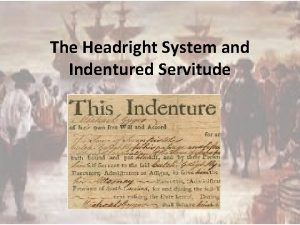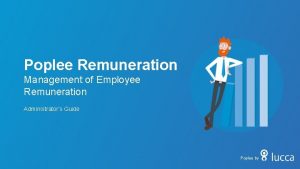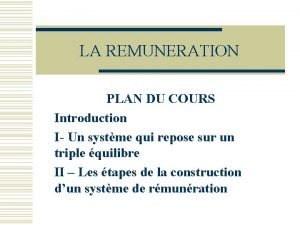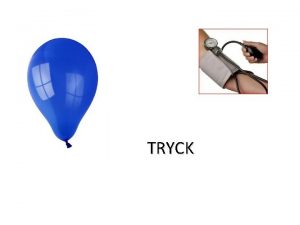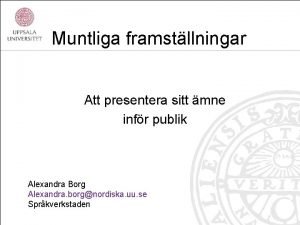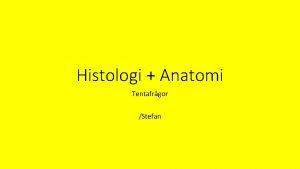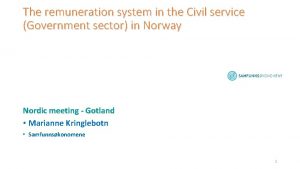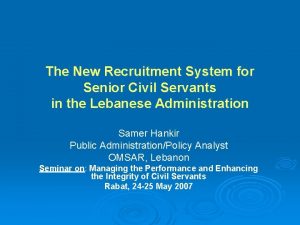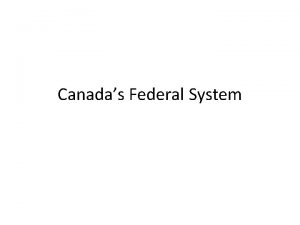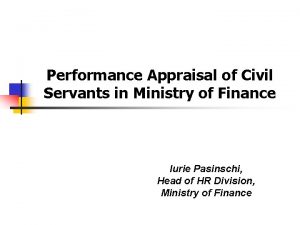The Remuneration System for Federal Civil Servants and









































- Slides: 41

The Remuneration System for Federal Civil Servants and Salary Reform Union, principally financed by the EU. A joint initiative of the OECD and the European In the Belgian Public Sector Johan Janssens - Vilnius 14 December 2006 “Remuneration Systems for Civil Servants and Salary Reform” © OECD

Union, principally financed by the EU. A joint initiative of the OECD and the European Career as a civil servant IN OUT recruitment retirement COPERNICUS reform © OECD

Union, principally financed by the EU. A joint initiative of the OECD and the European Citizen = always central IN OUT recruitment retirement COPERNICUS reform © OECD

© OECD Union, principally financed by the EU. A joint initiative of the OECD and the European

Union, principally financed by the EU. A joint initiative of the OECD and the European The former career and reward system … 1. Gave rise to problems of internal equity Ø Because job content was not considered in reward 2. Did not stimulate individual development Ø Because career & salary growth were largely determined by years of service and quota 3. Created obstacles for internal mobility Ø Because the system was highly complex and not transparent 4. Created problems in recruiting & retaining skilled people Ø Because remuneration was not always in line with market © OECD

Union, principally financed by the EU. A joint initiative of the OECD and the European Copernicus reform A new organisational structure A modern vision for human resources Better Employer & better service provider A new management culture New ways of working “Copernicus” is an integrated approach to the reform of the Federal Administration based on 4 pillars. Each pillar contributes to achieving the two central objectives. © OECD

Union, principally financed by the EU. A joint initiative of the OECD and the European PILLAR ONE A new organisational structure Key changes: l l A revision of the policy areas and services dealt with by each ministry; realignment of the way they are organised; grouping of related policy areas in new services. Abolition of the ministerial cabinets, resulting in increased efficiency and responsibility for the Administration. © OECD

Public F P S I n t e rn a l A f f a i rs FPS Social Security F P S P ublic Healt h FPS Defences FPS Justice … FPS Finances F P S F o re i g n A f f a i rs ICT Services B&B Federal P&O Horizontal PMO 4 Union, principally financed by the EU. Federal Public services A joint initiative of the OECD and the European 10 Vertical © OECD

Union, principally financed by the EU. A joint initiative of the OECD and the European PILLAR TWO A new management culture Key changes: l l Top managers work according to mandates. Management has to take a key role in a new process of evaluation of staff. Effective control mechanisms ensure freedom to act in a clear framework. Personnel are better informed about their role and the changes underway. © OECD

Union, principally financed by the EU. A joint initiative of the OECD and the European N N-1 N-2 N-2 N-2 N-3 Mandates apply to the top three levels of management (N, N-1, N-2). Within the FPS Finance, by far the largest public service, there is also an N-3 level, governed by a mandate. © OECD

Union, principally financed by the EU. A joint initiative of the OECD and the European PILLAR THREE New ways of working – benefits to staff and citizens Key changes: BUSINESS PROCESS RE-ENGINEERING AT THE HEART OF COPERNICUS Improvement through investment in: l people: training and career development l infrastructure: new buildings, offices, facilities and equipment l systems: IT, e-government, support systems l processes: better, leaner, more cost-effective processes, delivering better services © OECD

Union, principally financed by the EU. A joint initiative of the OECD and the European PILLAR FOUR A modern vision for human resource management Key changes: l l Greater focus on skills development and career prospects for staff. Aim to make the civil service a better employer. The new human resource policy places a new value on the skills of its personnel and on increasing personnel satisfaction. 3 main aspects of human resource management: • • • Professional selection and recruitment of personnel. Remuneration and career possibilities in line with the private sector. Skills-building and personal development. © OECD

© OECD Union, principally financed by the EU. A joint initiative of the OECD and the European

Union, principally financed by the EU. A joint initiative of the OECD and the European Organisation Management Level A Level B management & staff functions study , conception or coordination functions specialised functions Level C logistic, support, administrative functions Level D easy administrative, manual functions © OECD

Union, principally financed by the EU. A joint initiative of the OECD and the European Graduate requirements Management University or level A & management experiences Level A Level B University (master) High school (bachelor) Level C Level D Interlevel promotion Secondary school No diploma © OECD

Union, principally financed by the EU. A joint initiative of the OECD and the European Pro info (situation 30/06/2006: 83. 897 federal civil servants) © OECD

Union, principally financed by the EU. A joint initiative of the OECD and the European Job classification domain of expertise levels Is in accordance with the needs of the government and with the competence of its staff l Values the public servants for its competences and its level of specialisation and expertise. l © OECD

1. Union, principally financed by the EU. A joint initiative of the OECD and the European Job classification of functions in 17 domains of expertise or knowledge. 2. 3. 4. 5. 6. 7. 8. 9. 10. 11. 12. 13. 14. 15. 16. 17. Budget & public finances Communication & information Economy Tax law Human & animal health Employment Sciences, studies & research General management Logistics Mobility & transport Social security & Social protection Juridical norms & disputes Technology & infrastructure Personnel & Organisation ICT Population & security International relations © OECD

Union, principally financed by the EU. A joint initiative of the OECD and the European Each domain of expertise is subdivided in expertise levels. Each expertise level classifies the functions of a similar level of complexity, technical know-how and responsibility. Expertise level A 5 Expertise level A 4 Expertise level A 3 Expertise level A 2 Expertise level A 1 lowest © OECD

Union, principally financed by the EU. Level A 5 Expertise level Level A 4 class Level A 3 level A 2 Level A 1 Economy I CT expertise class T ax laws Domain of class Communication A joint initiative of the OECD and the European Function class = intersection where the domain of expertise and expertise level crosses. Function class determines the place of a civil servant in its career. … © OECD

Union, principally financed by the EU. A joint initiative of the OECD and the European Pecuniary career Class Salary scale A 51 A 52 A 53 A 41 A 42 A 43 A 31 A 32 A 33 A 21 A 22 A 23 A 11 A 12 © OECD

Pecuniary seniority Union, principally financed by the EU. A joint initiative of the OECD and the European l l The pecuniary seniority corresponds with the duration of the services taken in account to calculate the salary. The raising in a salary scale depends on the pecuniary seniority. © OECD

Class Union, principally financed by the EU. A joint initiative of the OECD and the European Horizontal salary scale progression Salary scale A 51 6 Y No CB A 52 6 Y No CB A 53 A 41 6 Y+CT No CB A 42 6 Y+CT No CB A 43 A 31 6 Y+CT CB=4200€ A 32 6 Y+CT CB=4200€ A 33 A 21 6 Y+CT CB=4200€ A 22 6 Y+CT CB=4200€ A 23 A 11 6 Y+CT CB=2800€ A 12 6 Y+CT CB=2800€ A 21 • Horizontal growth = progression to higher salary scale through competence test (CT) • Competence bonus (CB) © OECD

Union, principally financed by the EU. A joint initiative of the OECD and the European Certified competence training actualises and develops the qualifications and competences; l ends after a validation test of the achieved knowledge; l is organised separately for each domain of expertise; l is mostly 6 years valid. l © OECD

Class Union, principally financed by the EU. A joint initiative of the OECD and the European Vertical salary scale progression Salary scale A 51 6 Y No CF A 52 6 Y No CF A 53 A 41 6 Y+CT No CF A 42 6 Y+CT No CF A 43 A 31 6 Y+CT CF=4200€ A 32 6 Y+CT CF=4200€ A 33 A 21 6 Y+CT CF=4200€ A 22 6 Y+CT CF=4200€ A 23 A 11 6 Y+CT CF=2800€ A 12 6 Y+CT CF=2800€ A 21 2 years 4 years 2 years Progression to a higher salary level after being selected for a job with substantially higher responsibilities © OECD

Union, principally financed by the EU. A joint initiative of the OECD and the European Levels B, C and D l Level B: l administrative, technical, financial or ICT-experts l Progression to higher salary scale through a competence test, after a certified competency training based on the content of the job Level C: administrative or technical assistants l Level D: administrative, technical, kitchen or cleaning co-worker Only horizontal progression: l Less importance to seniority © OECD

Union, principally financed by the EU. A joint initiative of the OECD and the European Level A Seniority A 11 Gross monthly amount minimum 2503, 07 € Net monthly amount 1538, 37 € A 32 11 years 4759, 04 € 2514, 00 € A 43 maximum 6748, 46 € 3318, 40 € © OECD

Union, principally financed by the EU. A joint initiative of the OECD and the European Level B Seniority minimum Gross monthly amount 1729, 96 € Net monthly amount 1212, 66 € Administrative expert maximum 3508, 19 € 1982, 18 € Techn. & financial expert minimum 1922, 38 € 1293, 18 € maximum 3789, 99 € 2107, 75 € ICT-expert minimum 1976, 15 € 1319, 98 € maximum 4026, 42 € 2209, 61 € © OECD

Union, principally financed by the EU. A joint initiative of the OECD and the European Level C Seniority Gross monthly amount Net monthly amount Administr. & techn. assistant minimum 1632, 91 € 1168, 38 € maximum 3107, 84 € 1816, 30 € Level D Seniority Gross monthly amount Net monthly amount Administrative coworker minimum 1472, 82 € 1089, 02 € maximum 2265, 13 € 1426, 76 € Technical Co-worker minimum 1509, 03 € 1107, 23 € maximum 2714, 04 € 1643, 89 € © OECD

Union, principally financed by the EU. A joint initiative of the OECD and the European Management & staff functions l l l l Categorie 1 = 72. 773, 36 € Categorie 2 = 79. 958, 24 € Categorie 3 = 91. 725, 42 € Categorie 4 = 102. 474, 78 € Categorie 5 = 122. 356, 94 € Categorie 6 = 143. 047, 82 € Categorie 7 = 164. 664, 51 € © OECD

© OECD Union, principally financed by the EU. A joint initiative of the OECD and the European

Union, principally financed by the EU. A joint initiative of the OECD and the European Working out the global remuneration = + gross monthly salary amount (= gross yearly salary amount corresponding to the pecuniary seniority & the salary scale * indexation / 12) + various taxable allowances, bonuses and benefits - social contributions - taxes - a particular social security contribution + various non taxable allowances, bonuses and benefits = Net monthly remuneration amount © OECD

Union, principally financed by the EU. A joint initiative of the OECD and the European Working out the salary: incomplete salary % performance x number of performed working days number of working days to perform according to the working timetable Clarification: l Working day = weekdays, except Saturday, Sunday, holidays l Performed working days : working days for which a salary is granted l Working timetable : number of working days to perform during a month by the civil servant © OECD

Union, principally financed by the EU. A joint initiative of the OECD and the European Net monthly amount Appointed civil servant - 7, 50% Fund of survivor’s pensions Contract civil servant - 1, 15% for sickness and invalidity insurance (allowances) - 3, 55% for sickness and invalidity - 0, 87% for unemployment insurance (medical care) insurance - Tax contribution - 3, 55% for sickness and invalidity insurance (medical care) - Special contribution for social security - 7, 50% for old-age and survivor’s pension - Tax contribution - Special contribution for social security © OECD

Union, principally financed by the EU. A joint initiative of the OECD and the European Various bonuses and benefits Housing Allowance Holiday Savings and Copernicus Bonus End of Year Allowance Foreign Language Allowance Higher Position Allowance Family Allowances Child or Adoption Allowance Competence Allowance Management Bonus Integration bonus © OECD

Union, principally financed by the EU. A joint initiative of the OECD and the European Various allowances Allowance = compensation Accommodation expenses l Transport expenses l Mileage expenses l Bicycle allowance l © OECD

© OECD Union, principally financed by the EU. A joint initiative of the OECD and the European

Union, principally financed by the EU. A joint initiative of the OECD and the European Copernicus for the civil servant l new possibilities for career development and mobility l new training opportunities related to work and personal development l a new salary structure l greater freedom and responsibility for management l evaluation to ensure improved personal development l more efficient ways of working l a better working environment with better tools Copernicus for the citizen l a citizen-centred Administration l a more accessible, more understanding Administration better, and more efficient services l increased confidence in the government and the public services it provides © OECD

Union, principally financed by the EU. A joint initiative of the OECD and the European Thank you for your attention © OECD

Union, principally financed by the EU. A joint initiative of the OECD and the European Sveikinu su Šv. Kalėdom ir Naujaisiais Metais! © OECD

Union, principally financed by the EU. A joint initiative of the OECD and the European Q&A © OECD
 Headright system indentured servants
Headright system indentured servants Railway discipline and appeal rules book
Railway discipline and appeal rules book Advantages and disadvantages of remuneration
Advantages and disadvantages of remuneration The greatest man in history had no servants
The greatest man in history had no servants Servants of the risen christ
Servants of the risen christ My servants the prophets
My servants the prophets Civil rights webquest
Civil rights webquest Poplee remuneration
Poplee remuneration Plateforme de preinscription en ligne
Plateforme de preinscription en ligne Cours sur la rémunération en grh
Cours sur la rémunération en grh Copiesenligne
Copiesenligne Equal remuneration convention 1951
Equal remuneration convention 1951 Reuben mbindu
Reuben mbindu Pyramide des rémunérations donnadieu
Pyramide des rémunérations donnadieu Cadbury report on corporate governance ppt
Cadbury report on corporate governance ppt What is labour remuneration
What is labour remuneration Introduction sur la rémunération
Introduction sur la rémunération Inclusive dispensation meaning
Inclusive dispensation meaning Kontinuitetshantering i praktiken
Kontinuitetshantering i praktiken Typiska drag för en novell
Typiska drag för en novell Nationell inriktning för artificiell intelligens
Nationell inriktning för artificiell intelligens Ekologiskt fotavtryck
Ekologiskt fotavtryck Varför kallas perioden 1918-1939 för mellankrigstiden
Varför kallas perioden 1918-1939 för mellankrigstiden En lathund för arbete med kontinuitetshantering
En lathund för arbete med kontinuitetshantering Underlag för särskild löneskatt på pensionskostnader
Underlag för särskild löneskatt på pensionskostnader Vilotidsbok
Vilotidsbok Anatomi organ reproduksi
Anatomi organ reproduksi Förklara densitet för barn
Förklara densitet för barn Datorkunskap för nybörjare
Datorkunskap för nybörjare Tack för att ni lyssnade bild
Tack för att ni lyssnade bild Debattartikel struktur
Debattartikel struktur Delegerande ledarskap
Delegerande ledarskap Nyckelkompetenser för livslångt lärande
Nyckelkompetenser för livslångt lärande Påbyggnader för flakfordon
Påbyggnader för flakfordon Lufttryck formel
Lufttryck formel Svenskt ramverk för digital samverkan
Svenskt ramverk för digital samverkan Bo bergman jag fryser om dina händer
Bo bergman jag fryser om dina händer Presentera för publik crossboss
Presentera för publik crossboss Teckenspråk minoritetsspråk argument
Teckenspråk minoritetsspråk argument Bat mitza
Bat mitza Klassificeringsstruktur för kommunala verksamheter
Klassificeringsstruktur för kommunala verksamheter Fimbrietratt
Fimbrietratt
